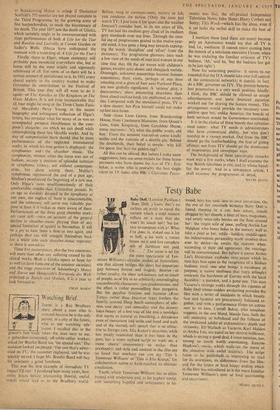Testy Babe
Batty DWI (London Pavilion.) 'lBaan Doll, ylnow they's no torture on earth to equal the torture which a cold woman inflicts on a man that she won't let touch her? No tor- ture to compare with it! What I've done is, staked, out a lot in •hell, a lot with a rotten house on it and live complete sets of furniture not paid for. . . .' The scene is set for
• • the most spectacular of Ten- nessee Williams's circular studies of frustration; one that almost bridges the short but important gap between .horror and tragedy. Horror--.--or rather cruelty, the sheer unkindness, not so much of people. as-of life in so arbitrarily intermingling uncombinablecharacters---just predominates, and the effect is rather pummeling than purgative. But the peculiar lyricism and humour (Rose Tattoo rather than Streetcar type) freshen the heavily scented Deep South 'atmosphere of idle- ness and 'decay and sensuality - rind the. drowsy lotus beauty of a lost way of life and a nostalgia that seems as natural as breathing, a decadence even of movement and smile and hand and walk and of the slurred; soft speech that is so attrac- tive to foreign ears. Elia Kazan's direction; while less purely mannered than it has- -been in the past, • has a more stylised script to work on, a more Osiris- commentary • to make; - than previously; and style and content" in • the film are • so fused that 'nowhere can you say 'This is Tennessee Williams' or 'This is Elia Kazan,' for collaboration seems• to have reached its ultimate conclusion.
Youth, which Tennessee Williams has so often treated with tenderness and, in his hapless world. with something hopeful and :1,114:M:dory in his
Mood, here has sunk into its oa a perversion. On the eve of her twentieth birthday. Baby Doll is found sleeping in a cot, hair asksay. mouth plugged by her thumb, a litter of toys, magazines, aad empty coca-cola bottles on the door around her : the virgin wife of poor, puffing Archie Lee Meighan who bores holes in the nursery wall to take a peep at her, while—baldish; middle-aged, his indeterminate personality made mushier -than ever by desire—he awaits the morrow when, according to their old agreement. the marriage will be consummated. But before it comes Archie Lee's frustration explodes into .arson which in turn lays him open to the vengeance of a Sicilian business rival, one who brings a steadiness of purpose, a native steeliness that (very tellingly) contrasts the harshness of Europe with the local flaccidity : a paradok, and a good one. This man • Vacarro's revenge works through the ripeness of Baby Doll whose-sudden awakening provides the film with a series of incidents in which beauty, fear and hysteria are precariously balanced to- gether, and with a performance -(from an actress new to us here, Carroll Baker, who somehow suggests,, in the one bland, blonde lace, both the soft animality of babyhood and the fullness of the awakened adult) of extraordinary depth and virtuosity. Eli Wallach as Vacarro, Karl Malden as Archie Lee, are equal to her °central-brilliance, which is saying •It good deal. I must-mention, too. among so much worth mentioning, Kenyon, Hopkins', music, which wails on the .nerve of the situation - with awful accuracy. The script (soon . to be .published) is interesting to road for its intentions, its differences from the film, and for the (more or less) happy ending which in the film has introduced to it the more familiar Tennessee Williams's note of final questioning and uncertainty.














































 Previous page
Previous page